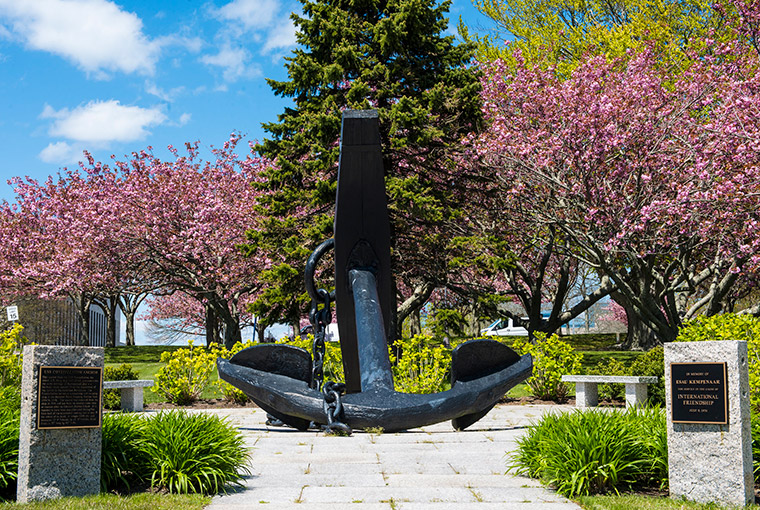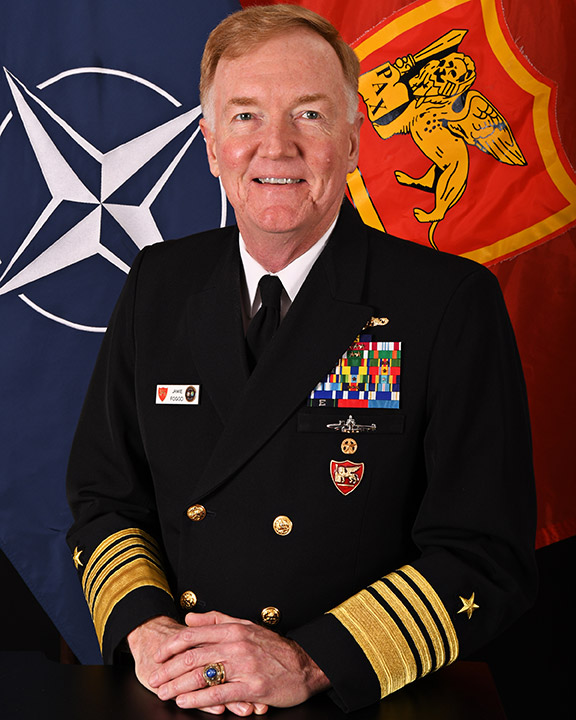Naval Forces Europe, Africa Commander Discusses European Picture, Arctic Challenges

Adm. James G. Foggo III, commander of Allied Joint Force Command Naples and U.S. Naval Forces Europe and Africa, spoke to the U.S. Naval War College audience June 9 via a video conference link.
His comments ranged from the geopolitics of Europe to U.S. and NATO efforts in Africa to the changing landscape in the Arctic. He later addressed the meeting of the Newport Arctic Scholars Initiative, which held a two-day virtual workshop June 9-10.

Adm. James G. Foggo III, commander of Allied Joint Force Command Naples and U.S. Naval Forces Europe and Africa
(Navy.mil/Released)
Foggo spoke about the strength of the NATO alliance. “We just celebrated our 71st birthday and don’t let anyone tell you any different, we’re going to be around for another 71,” he said.
Foggo discussed what he has called the “Fourth Battle of the Atlantic,” which refers to Russia’s increasing military activities in the North Atlantic. He mentioned Russia’s buildup of submarine operations in the Arctic.
As a counterpoint, Foggo described the October 2018 deployment of USS Harry S. Truman (CVN 75), the first time an American aircraft carrier had operated above the Arctic Circle since 1991. The carrier was “operating the F-18 in 12-to-18-foot seas, doing cat (catapult) shots,” Foggo said, adding that the carrier strike group did a good job handling the harsh and unfamiliar Arctic conditions.
Despite the recent COVID-19 pandemic, Foggo said, “We’re still open for business here. We’re still operating.”
He mentioned the May deployment of a naval surface action group, consisting of four U.S. ships and a British frigate, to the Barents Sea, which borders Russia and Norway. It was the first deployment of that kind to the Arctic since the early 1990s, he said.
“We operated, and we learned a lot,” Foggo said.
“I think it sent the right message to the Russians. Then, in deference to them, we left on the 8th of May, before their nine-day victory celebration,” he said, referring to the Russian holiday that commemorates the 1945 surrender of Nazi Germany.
Looking farther south, Foggo discussed the importance of the Black Sea.
“There’s a lot of economic traffic that goes over and under that sea. Pipelines and lines of IT communication there,” he said. He mentioned that the United States will participate in the annual Sea Breeze exercise, which in 2019 included 19 nations, 32 ships, 24 aircraft and more than 3,000 troops in and around the Black Sea.
“These exercises are important. Presence is important. Power projection is important,” Foggo said, adding that this is especially true since Russia has worked to close off the Sea of Azov, which borders Ukraine, from the rest of the Black Sea.
Between U.S. and NATO partners, “There’s about 240 days of coverage or presence there, and the rest of the time we rely on our friends and partners and allies like the Turks, the Bulgarians and the Romanians,” he said.
He also described the command’s training mission in Iraq and efforts to build peace and security in Africa, including helping to form an early warning system for natural disasters.
Great-power competition has arrived in Africa, Foggo said, citing as one example the Chinese military base opened in Djibouti in 2017.
Foggo discussed maritime assistance provided by the United States in Africa over the past decade on issues such as anti-piracy, including the summer 2019 deployment of the expeditionary fast transport ship USNS Carson City to work with Western Africa nations.
These efforts, particularly in the Gulf of Guinea, potentially laid the groundwork for the successful rescue of a Chinese fishing boat last month by the Nigerian Navy, he said.
“It is very important for us to continue to have presence in Africa,” Foggo said.
Finally, Foggo addressed what he called the current crisis surrounding equality, both in the United States and in other places around the world.
“I charge the leaders out there not only to go out and do your jobs to the best of your ability and enjoy every minute of it, but be cognizant of the problem we have in our own ranks and our own country, and do something about it,” he said. “Take advantage of this awakening period to make life better for everyone and be inclusive.”
